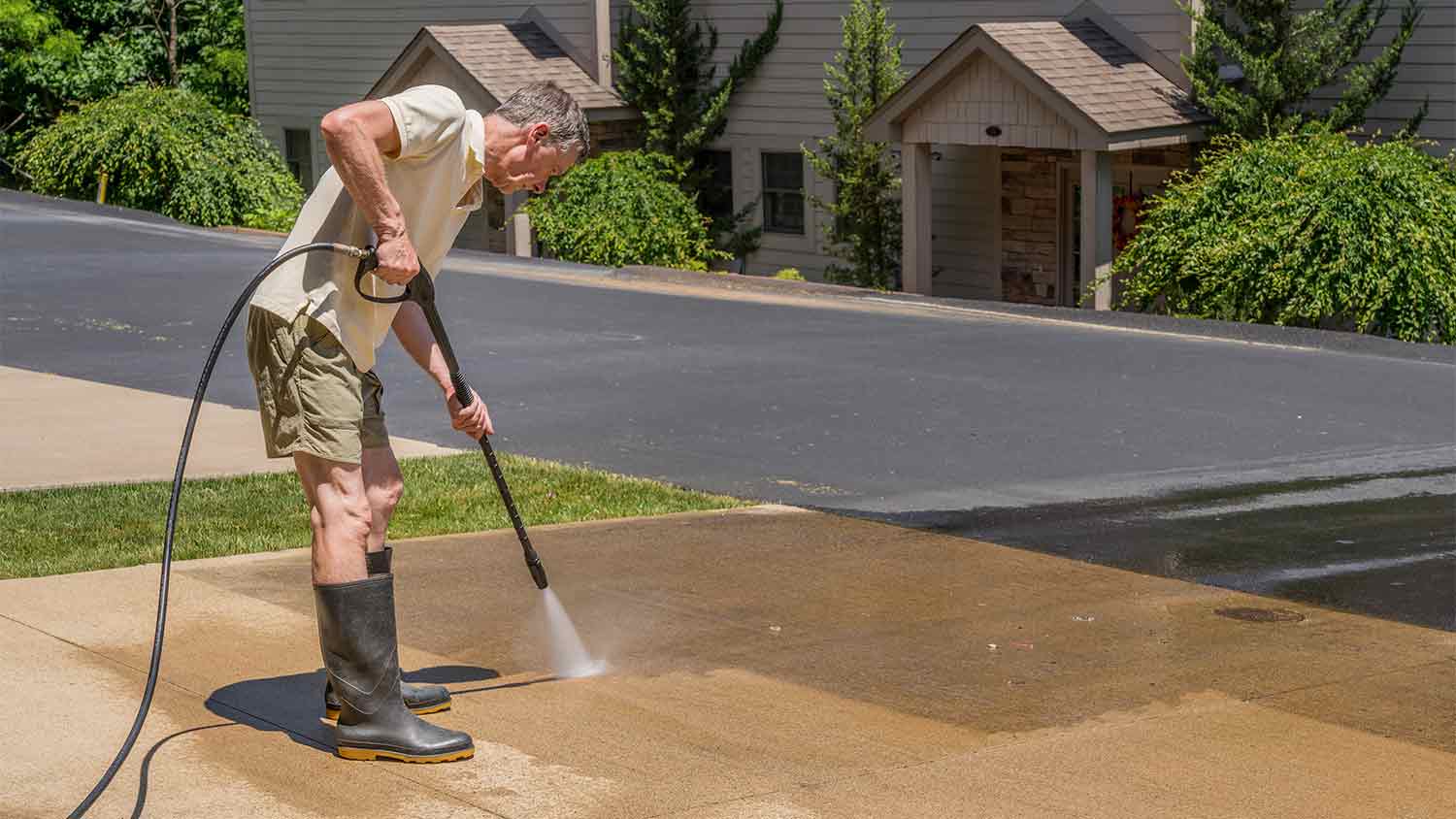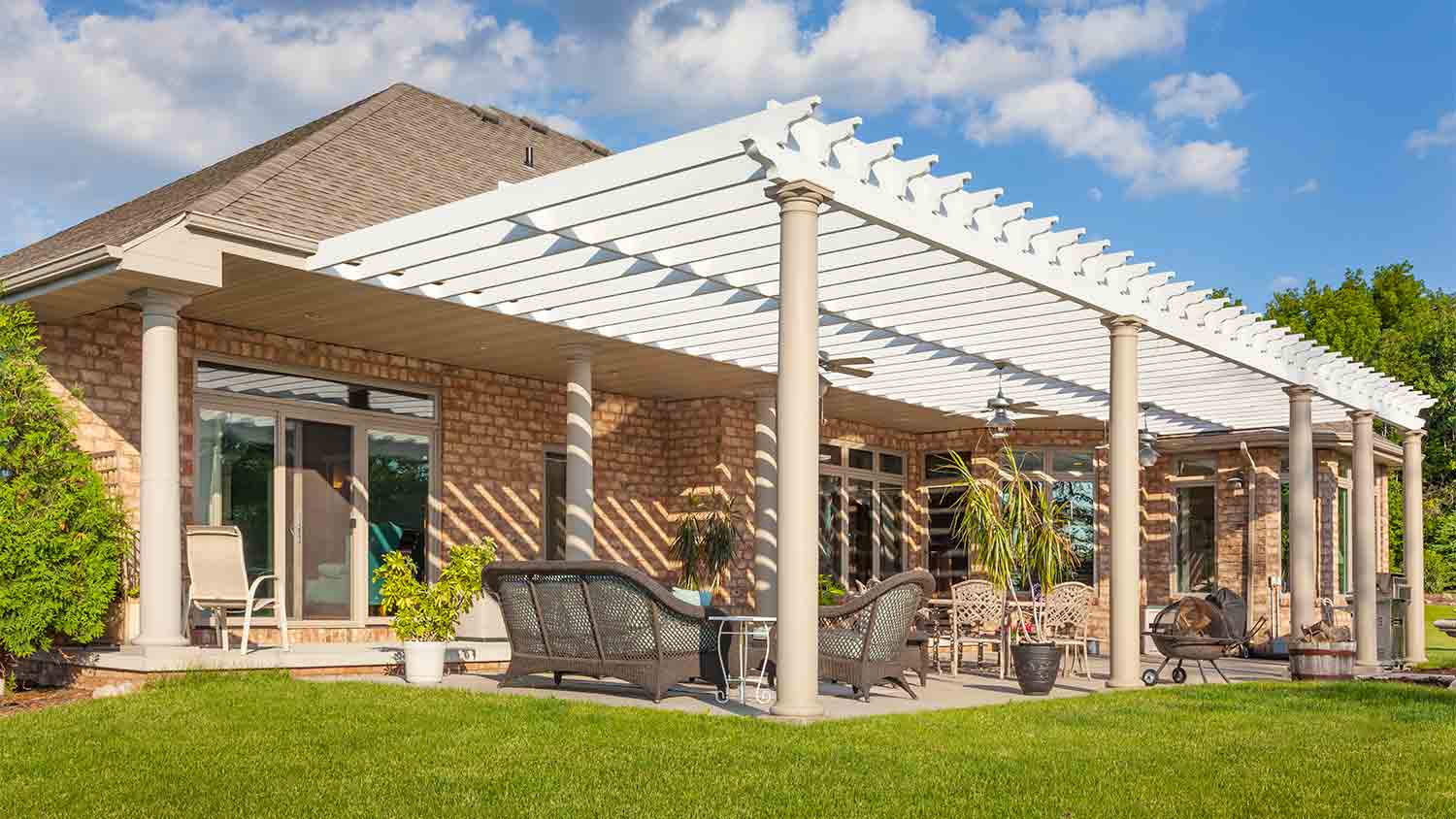Here’s the Average Life Span of Concrete
Nothing lasts forever, but there are ways to make it last longer


From foundations and driveways to porches and patios, you’ll find some use for concrete practically everywhere you turn in your home. But have you ever wondered, How long does concrete last? While it seems like an ultra-durable material, you might not know if concrete is something you can fix and forget about or if it needs regular replacement. We’ll uncover not only how long concrete lasts but know when it’s time to move on to new concrete.
How Long Does Concrete Last on Average?
Concrete lasts around 50 to 100 years, according to the Portland Cement Association, which focuses on cement-related policy, education, and research. Of course, this is quite the range, but concrete life span depends on numerous factors. Concrete is a mix of sand, an aggregate, and a binder—and cement is the most common binder, which is why concrete and cement are often used interchangeably.
Certain concrete uses have different life spans based on their installation and usage. See the differences in the table below.
| Type of Concrete Project | Life Span in Years |
|---|---|
| Sidewalk | 20-40 |
| Patio | 30+ |
| Stamped | 30+ |
| Driveway | 40+ |
| Interior Floor | Indefinitely |
Keep your concrete clean to extend its longevity. Remove weeds, dirt, and other debris with a hose. Avoid using harsh chemicals when cleaning, as it can degrade your concrete.
Factors That Affect Concrete Lifespan
Some types of concrete will last longer than others, simply based on its strength profile. Concrete’s strength comes from a combination of multiple factors, including the quality of the cement and other materials, how compact it is, and the temperature and humidity levels during the pouring process. There are different strength levels for numerous types of concrete too, such as reinforced concrete that includes steel reinforcement built to withstand greater amounts of pressure versus a ready-mix concrete a homeowner might use.
To summarize, not only is concrete’s durability greatly impacted by the type and initial mixing, it’s also impacted by the following factors. In some cases, exposure to these factors can shorten the concrete lifespan to as little as 30 years.
Contents of the concrete mixture
Exposure to weather and moisture conditions
Exposure to chemicals such as deicers
Curation process after pouring
Average amount of traffic
Weight of vehicles on the slab
Long-term maintenance such as sealing
Subbase and subgrade quality
Tips to Prolong Concrete Life Span
As a homeowner, it may be difficult to know how the concrete was originally mixed, if the concrete pourers followed the proper curing practices, or if it faced exposure to certain chemicals. So, what can you do now to foster a longer life span? Keep reading for tips to help prolong concrete.
Keep the Concrete Clean

While its low maintenance may be one of concrete's top benefits, it is still important to keep it clean. For spaces such as your concrete patio, front porch, or driveway, you can start by regularly removing the dirt and debris that accumulates. If dirt stays on too long, it can cause holes in the surface of the concrete, which leads to crumbling.
Simply spraying with a garden hose is likely sufficient, but pressure washing is a fantastic way to remove tough built-in dirt. You can also use dish detergent and a broom to get rid of stubborn stains, like bird droppings.
Reapply a Protective Coating
Applying or reapplying a sealer every two or three years will also go a long way in preserving the durability of your concrete and is one of the most important concrete maintenance to-dos. Not only does it help with the preservation, it makes it look shinier. While it might not be the most fun chore around the house, the cost to seal concrete is minimal compared to repairing or replacing it.
When applying a sealer, give it time to completely dry before moving furniture. Otherwise, the sealer may end up with bubbles or an uneven application.
Avoid Harsh Chemicals
Certain chemicals, such as sulfates and ammonia, can weaken your concrete and even cause significant damage. If you live in an area where you need deicing salts, try to use them sparingly because they can cause damage to stamped or treated concrete.
Remove Unwanted Plants and Trees
Trees, plants, and shrubs can damage concrete if the roots grow near or beneath it. As the greenery grows, the roots spread and it pushes up through the concrete, potentially causing damage. Trimming the roots or removing the plants altogether is the best way to keep this from happening.
Cover if Possible

You can’t do much to change the outside environment, but if there’s any possibility of covering your concrete with something like a canvas or pergola, you should. Covering it offers a layer of protection against the outside elements, including extreme temperatures and moisture.
Repairing vs. Replacing Concrete
Overall, it’s best to replace concrete when the cost of repairs surpasses the replacement price. Concrete repair costs an average of $1,800, while replacement often costs between $2,000 and $7,000, depending on the size of the area. Replacement costs about $15 per square foot.
Thankfully, there are many stages of concrete repair to consider before opting for replacement. Surface cracks, settling, and even minor crumbling have more cost-effective fixes than starting over. However, it's important to hire a concrete contractor if the slab's structure is in question.
For example, concrete foundations require an expert to ensure that it remains structurally sound and to verify it was installed correctly. Concrete driveways, walkways, and patios are a bit more flexible when considering repairs or replacement, since concrete resurfacing, mudjacking, or even resealing may do the trick.
Signs It’s Time to Replace Concrete
Eventually, even a material as durable and reliable as concrete needs replacement. There are a few signs to look for to indicate if a replacement should happen sooner versus later.
Age: If you live on a property that is several decades old and you suspect it’s the original driveway, your concrete may need to be replaced sooner.
Cracking, settling, and pitting: If you notice multiple cracks, areas where there are depressions or settlement in the concrete, or has potholes, then consider replacement (although new concrete cracking can occur). You can try repairing patches of concrete, but you may eventually need a full replacement.
Severe discoloration: Stains and exposure to sunlight will cause heavy discoloration, but a stain remover can usually take care of this. If you try removing the stains and it doesn’t make a difference, then it’s possible it needs replacement.
Uneven surface: An uneven surface may occur from the ground shifting naturally or if tree roots have grown through it. If the surface is too uneven even after patching and repairing, then replacement is the next step.
As a homeowner, a full replacement might not be the only solution. You can make your own minor concrete repairs for cracks, potholes, or other minor damage, which will save money with labor costs. Purchasing a concrete repair patch kit ranges from $10 to $150 and may help extend the concrete lifespan by a few years or longer.
If you do need to replace concrete, especially a concrete driveway, it’s best to hire a professional concrete driveway contractor near you. A professional will know which type of concrete holds up best for your type of environment and lifestyle so you can take advantage of the durability of concrete for years to come.
Sara Coleman contributed to this piece.
The average cost to replace concrete depends on the amount of material you need. However, you can expect the cost of replacing a concrete driveway to range from $2,000 to $7,000, or about $15 per square foot.
If you want to install or replace a concrete patio, the cost ranges from $800 to $9,000, depending on the size and exact materials. If you only need a slab, concrete slab costs range from $4 to $8 per square foot, or an average of $5,400.
Like all building materials, concrete weakens with age due to temperature changes, moisture, and cracks that widen over time. Keep in mind that there are ways to keep your concrete strong by resealing it every two to three years, avoiding harsh cleaning chemicals, and addressing small cracks as quickly as possible.
Yes, concrete lasts much longer than other common building materials. For example, asphalt lasts between 15 and 30 years on average, a small fraction of concrete's 50- to 100-year life span. Stone pavers on driveways and patios will last between 20 and 25 years without major repair. In other words, concrete is your best bet for long-term investment and minimal upkeep.
















